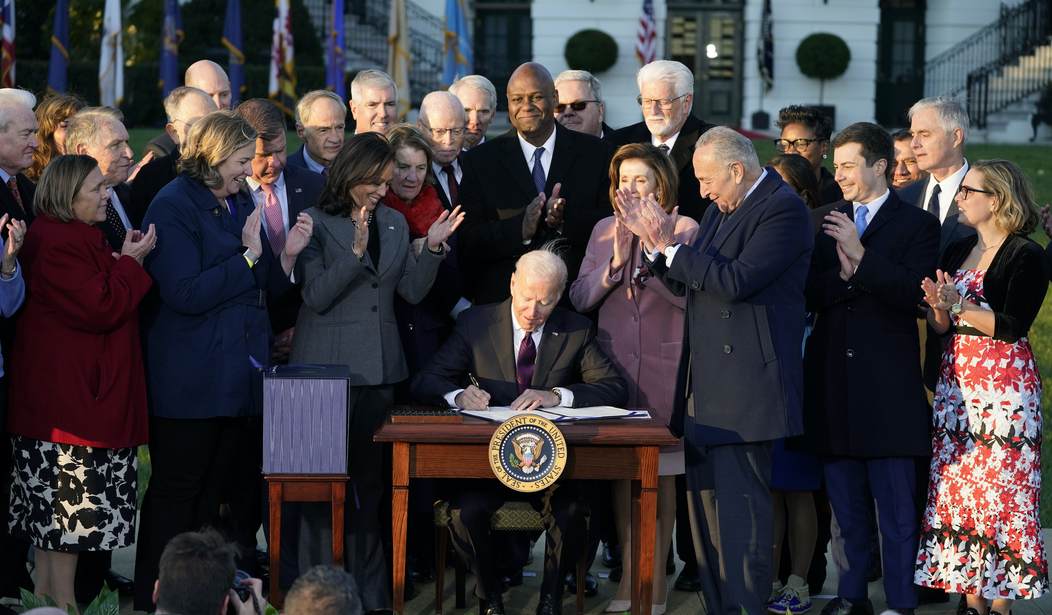What's wrong with the economy? Nobody seems quite sure, but it's clear that the Biden administration's $1.9 trillion stimulus package passed in March, on top of the $900 billion approved in December, the last full month of the Trump administration, has not had the intended results.
Yes, the economy has grown, and so have wages. But the assurances of President Joe Biden, Treasury Secretary Janet Yellen and Federal Reserve Chairman Jerome Powell that inflation is just "transitory" grow less and less credible.
Warnings of this came not just from Republicans but from impeccably credentialed Democrats -- from former Treasury Secretary and Obama administration economic adviser Lawrence Summers and from Obama's Council on Economic Advisers head administration lead economic adviser Jason Furman.
Similar apprehension was expressed this week by Clinton administration domestic adviser William Galston in the Wall Street Journal and from Obama consigliere Steven Rattner in the New York Times. "Inflation isn't going away" is the headline of Galston's article. "Enough already about 'transitory' inflation," read the lead sentence in Rattner's.
Biden's policies, including another trillion dollars in the recently signed "infrastructure" bill and another few trillion in the Building Back Better proposal, seem based on policies that became standard operating procedure in the decades after World War II.
In those days, you got economic recessions when big auto and steel companies piled up inventories -- they didn't have computer tracking -- and laid off their blue-collar workers. I saw this growing up in Detroit in the 1950s, when my physician father's income dropped by half in the recession of 1957-58. Recoveries occurred when money was pumped in by Federal Reserve interest rates cuts or the Kennedy tax cuts.
Recommended
But the American economy no longer operates like one giant factory. A better description is economist Arnold Kling's PSST theory, which argues the economy consists of numerous patterns of sustainable specialization and trade.
These were disrupted in two unfamiliar ways following the recession of 2007-09 and amid the COVID-19 restrictions of 2020-21. The recession came after 24 years of the "great moderation," with low inflation and substantial growth only briefly interrupted by two mild recessions.
Over that time, many patterns of specialization and trade had grown flaccid and stale. The fall 2008 collapse prompted firms to slough off what economist Tyler Cowen called "zero marginal product" operations and workers.
Democrats Summers and Furman attribute the sluggishness of the post-2008 economic recovery to the Obama administration's inability to pump more money into the economy. In contrast, they argue, this year, Biden Democrats overcompensated by pumping in too much.
But it takes time for entrepreneurs, managers and workers to develop new sustainable patterns of specialization and trade. And the Obama stimulus, on the advice of feminists, de-emphasized jobs for "burly men" and instead subsidized public-sector jobs, many of which (e.g., university administrators) subtracted rather than added value to the larger economy.
These past 22 months have seen large parts of the economy severely disrupted, while others are preternaturally busy as affluent elites work comfortably in home offices over Zoom. Many have responded by exiting the workforce, as many women did after female workforce participation peaked in the 1998-2000 boom.
Thus, workforce participation hasn't rebounded to pre-COVID levels, and many employers can't find workers to take open jobs. The disruption of formerly sustainable PSST shows up in supply chain delays, truck driver shortages, computer chip nonavailability and record numbers of people quitting their jobs last month.
It reminds me of the song "Take This Job and Shove It," which came out in 1977, another year of high inflation, sluggish growth and economic policy misfire.
One problem: Policymakers lack precedents of pandemic-triggered shutdown to learn from, though perhaps the influenza epidemic of 1918-19 amid raging inflation and then recession could provide useful instruction. There were only limited and local shutdowns, and the bedridden Democratic President Woodrow Wilson ignored macroeconomic ructions. He was repudiated 60% to 34% in the 1920 election, and his successor, Republican Warren Harding, just let the recession burn itself out, as James Grant recounts in "The Forgotten Depression: 1921." Americans quickly developed new patterns of sustainable specialization and trade. In the next dozen years, they were able to buy their first automobiles, refrigerators and washing machines.
My view is that economists, like political scientists, have been over-fixated on the Republican collapse and Democratic successes in the 1930s and have ignored lessons from the quantitatively greater Democratic collapse in 1918-21 and the Republican successes in the 1920s. Maybe it's just coincidence of happenstance, but current polling suggests that if opinion stays fixed -- a big if -- Republicans could win more House seats next year than they have since the 1920s. Too much stimulus may be worse than no stimulus at all.
























Join the conversation as a VIP Member